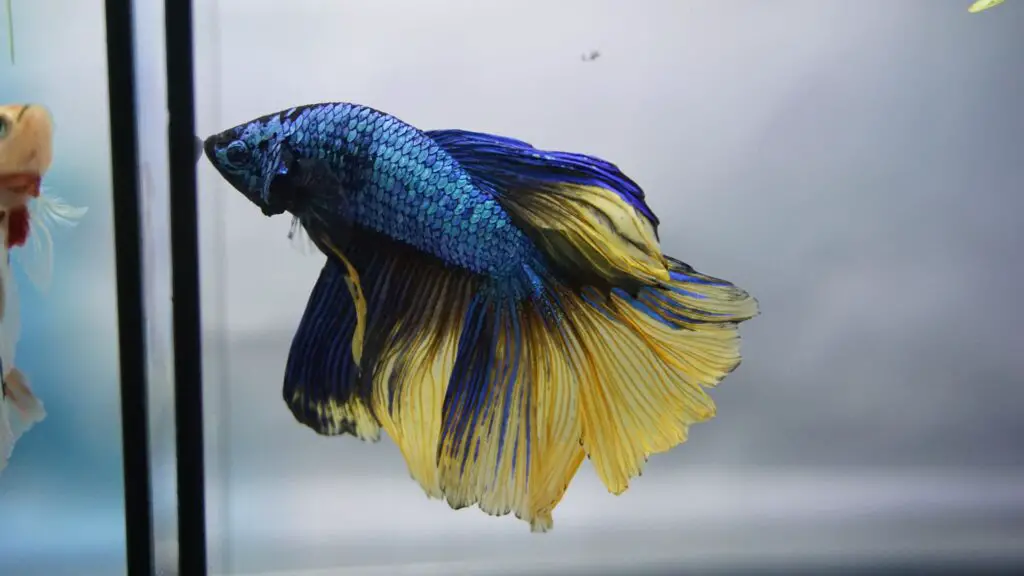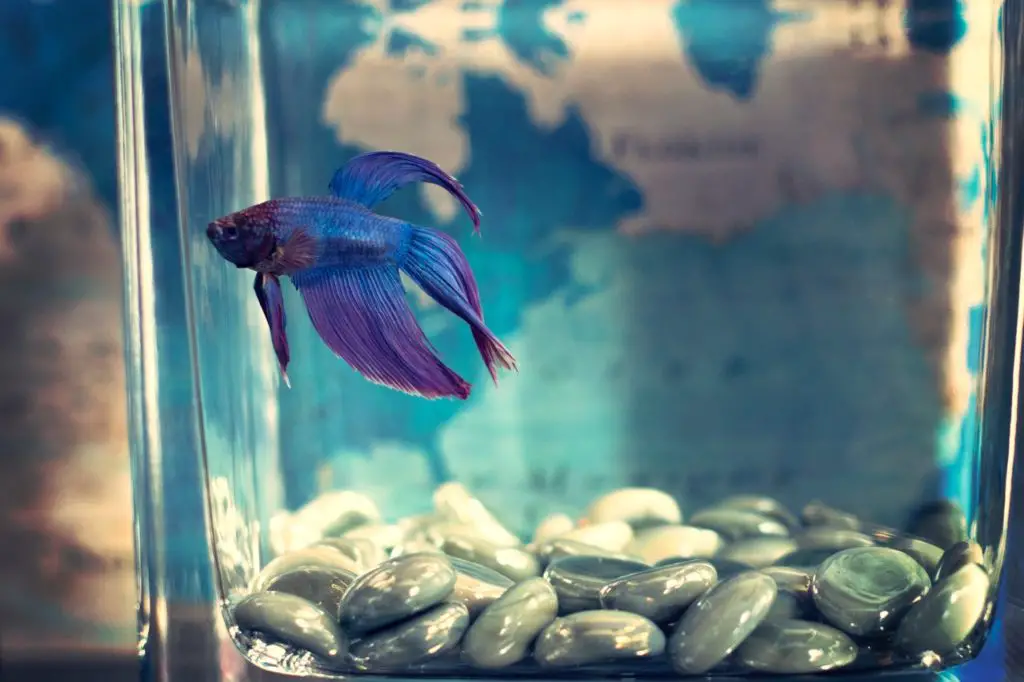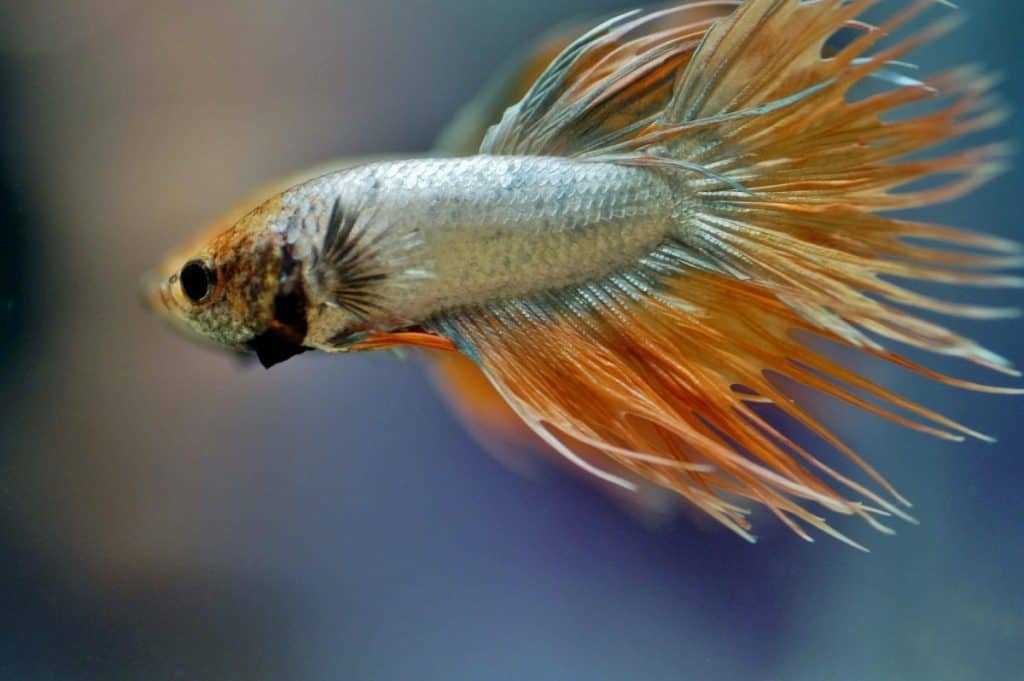Bettas are known for their vibrant colors and playful personalities; however, one of the most critical questions is, “How long do betta fish live?” In this blog post, we will discuss the lifespan of betta fish and how to make sure they live as long as possible.
Betta fish typically live for 2-3 years, though they can sometimes live up to 5 years if they are well cared for. To ensure your betta lives a long and healthy life, provide clean water, a balanced diet, and the proper tank setup.
If you want your betta fish companion to have a good quality of life well into old age while making sure they’re comfortable and content during their time with you, read on!
Average Lifespan Of A Betta Fish
The average life expectancy of a betta fish is typically between two and three years. However, with proper care and attention, the lifespan of a betta fish can be extended to four or five years! To ensure your betta lives as long as possible, it’s essential to understand its life cycle.
Betta fish begin their life by hatching from eggs about 48 hours after spawning. After this stage, they will go through several steps before reaching adulthood. At full maturity, they will get an age of six months to one year old. They are most active and healthy when appropriately fed and kept in clean water during this time. Once they reach 1-2 years old, depending on their size and health condition, they may start showing signs of aging, such as slower activity levels or fading colors.
By understanding the life cycle and considering factors like diet, tank environment, and genetics—you can help keep your betta healthy for longer than the average lifespan! With some effort and dedication, you can extend their longevity beyond five years, ensuring your beloved pet remains happy throughout its lifetime!

Factors That Impact Betta Fish’s Life Expectancy
Several factors significantly impact the life expectancy of a betta fish. Water temperature, tank size, diet quality, stress levels, and tank cleanliness are the five most essential elements to consider when determining how long your pet will live.
Water temperature should remain between 76-82 degrees Fahrenheit for optimal health in bettas. Smaller tanks can rapidly heat up during warm days, which can cause overheating in the summer months, while larger tanks provide more space, oxygenation, and better water conditions throughout all seasons.
Diet quality is essential in maintaining good health; high-quality food should be provided daily, with occasional treats of frozen brine shrimp or bloodworms being beneficial.
Stress levels must also be monitored at all times since too much stimulation can lead to disease or illness that could shorten your pet’s lifespan. Lastly, tank cleanliness must not be overlooked since dirty water can harbor bacteria that could make your betta sick if left unchecked over time.
It’s clear then that careful consideration needs to be given to each of these influences on a betta’s life span to reach its full potential. With vigilant monitoring and proper maintenance, you’ll ensure your beloved pet lives a long, happy life!
Ways To Increase The Lifespan Of A Betta Fish
Proper care of a betta fish is essential to ensure its life expectancy. Here’s what you need to know about the basics:
- Tank size – Betta tanks should be at least 2 gallons, with 5-10 ideal for larger species. Don’t overcrowd your tank, as this can cause stress and lead to health issues in the long run.
- Water temperature – Bettas prefer water that is between 77-82 degrees Fahrenheit (25-28C). To maintain optimal temperatures, use an aquarium thermometer and ensure the heater isn’t too close to the filter intake tube.
- Food quality – Feeding your betta high-quality food will help keep them healthy and happy. Choose foods specifically designed for their dietary needs and avoid overfeeding, which can contribute to poor health.
Finally, regular maintenance and disease prevention are key factors in extending your betta’s lifespan. Make sure to change out 25% of the tank water weekly, vacuum regularly, test water parameters often, watch for signs of illness or parasites, and quarantine any new additions before adding them into the tank environment. You can give your betta fish a longer and healthier life with proper care and attention!

Signs That A Betta Fish Is Reaching The End Of Its Life
Betta fish have a lifespan of between 3 and 5 years, depending on their living conditions. As they age, they may show signs indicating they are reaching their lives end. Here is a table with some common symptoms:
| Signs | Causes | Remedies |
|---|---|---|
| Decreased appetite and lethargy | Old age or illness | Provide nutritious food and clean water; keep tank warm (76-82°F) |
| Unusual swimming behavior, such as circling or darting around tank walls | Illness or injury | Change the water regularly to reduce stress; ensure the aquarium has plenty of oxygenation; check for parasites; consider quarantine if necessary. |
| Color loss or fading colors | Aging process, poor nutrition, disease, changing environments | Ensure proper diet, adequate lighting and heating, and regular water changes; monitor health closely for any sudden changes in color/behavior |
As betta fish reach old age, there will be physical changes too. Their fins may become less vibrant and more brittle due to decreased elasticity. Additionally, scales and skin may begin to dull over time as well. Lastly, you might notice increased amounts of white fungus-like growths around the mouth area caused by an accumulation of bacteria from stagnant water conditions. All these signs indicate that your beloved betta fish is reaching the end of its life cycle.
It’s important to remember that all bettas experience aging differently, so observing them carefully for any subtle behavioral and physical changes throughout their lifetime is essential. Recognizing signs early on and providing proper care tailored to their needs over time can help prolong their natural lifespans!

Frequently Asked Questions
What Is The Ideal Temperature For A Betta Fish To Live In?
Regarding betta fish, the temperature is critical to achieving optimal life expectancy. Understanding the ideal temperature for your betta fish is essential so they can live their longest and healthiest lives. So what is the suitable temperature that makes up the proper environment for your betta?
The optimal temperature range for keeping healthy betta fish lies between 76-82°F (24.5-28°C). This range allows them to stay active and explore their tank without being too cold or hot. For example, when temperatures drop below 76°F (24.5°C), bettas can become lethargic and be prone to infection due to low immune system functioning caused by the cold water.
Similarly, if temperatures exceed 82°F (28°C), bettas may start swimming oddly or have difficulty breathing because of overheating. To ensure your pet has the best chance of living a long and happy life, use a reliable thermometer to maintain a consistent temperature within this range daily.
Additionally, many experts recommend setting up two separate thermometers – one placed near the top of the aquarium and another near its bottom – as this will give you an accurate reading throughout all layers of water in which your betta swims. Keeping track of your tank’s temperature with these two devices will help prevent any unexpected spikes or drops, so make sure not to overlook this simple yet essential step!
What Type Of Food Should I Feed My Betta Fish?
Awareness of the best food types for your betta fish is essential to ensure a healthy and long life. What you feed your betta fish can impact nutrition, diet, and overall health. In this article, we’ll discuss what food should be fed to betta fish to maintain their health and promote a longer lifespan.
When it comes to feeding your pet betta fish, several options are available. Here’s a breakdown of some of the different types of food that may be appropriate for your betta:
- Pellets – These are usually formulated specifically for bettas and contain all the necessary vitamins and minerals they need. They come in various sizes, so you can choose one that best suits the size of your fish.
- Freeze-dried foods – This includes things like bloodworms or brine shrimp, which make good snacks for bettas. These foods provide essential proteins and other nutrients, such as Omega 3 fatty acids, which help keep their fins strong.
- Live foods – include small insects such as crickets, which provide additional protein and stimulate natural hunting behavior in bettas.
- Vegetables – Bettas love fresh vegetables such as cooked spinach or peas, which provide them with important vitamins and minerals they might not otherwise get from their regular diet. It’s important to remember to only give them vegetables in moderation, though!
In addition to providing the right types of foods, it’s equally important to understand how much to feed your betta at each mealtime. Overfeeding can lead to obesity and other issues, while underfeeding can cause malnutrition and poor health over time, significantly shortening their lifespan.
The ideal amount will depend on age, activity level, water temperature, breed, etc. Still, generally speaking, a single adult male should consume no more than two pellets daily, while females should eat no more than one pellet daily. Remember, too, that if you decide to supplement their diet with live or freeze-dried foods, these should take up no more than 10% total volume of food given throughout the week (including pellets).
By understanding proper nutrition for our beloved pets, we can keep them happy and healthy through every stage of life! Properly caring for a pet isn’t just about giving them delicious treats; it’s also about ensuring they receive optimal nutrition to thrive into old age. With patience, dedication, and knowledge, any aquarist can become an expert on maintaining their own betta fish’s diet plan—ultimately helping extend its lifespan significantly!
Are Betta Fish Compatible With Other Fish Species?
Betta fish are among the most popular aquarium species, and many question their compatibility with other fish species. When considering tank mates for betta fish, it’s important to understand the unique needs of these vibrant creatures and how compatible they can be with other types of fish.
When selecting a tank mate for your betta, you need to consider both the size and temperament of the fish in question. Bettas are territorial by nature, so while they may be able to coexist peacefully with certain kinds of compatible fish, introducing too many into the same habitat could lead to aggression. Some smaller varieties make excellent companions for bettas – such as neon tetras or small dwarf corydoras catfish. These other species typically stay out of harm’s way unless provoked by a larger inhabitant like a betta!
As an expert on betta fish life expectancy, I recommend researching before making any decisions. You must select suitable tank mates based on their individual temperaments and sizes, ensuring that all inhabitants get along harmoniously to create a safe and healthy environment for them all. Doing this helps ensure your betta will live the longest possible lifespan in its new home.
How Often Should I Change The Water In My Betta Fish’s Tank?
Maintaining the water quality in your betta fish tank is essential to keeping them healthy and happy. Understanding how often you should change the water is important since this will greatly affect their life expectancy. Here are some tips for ensuring your betta fish get proper care:
- Monitor the water levels regularly – check for any changes in temperature, clarity, or odor.
- Perform partial water changes every two weeks – remove ¼-⅓ of the existing tank water and replace it with fresh dechlorinated tap water brought to room temperature.
- Replace gravel or substrate when needed – if there’s excessive buildup or algae growth, it may be time to start over with new materials inside the tank.
As a betta fish life expectancy expert, I can tell you that properly caring for your betta involves more than just feeding them food once a day! Frequent water changes help keep their environment clean and safe from toxins, bacteria, and other contaminants. This ensures they have access to plenty of oxygenated and filtered fresh water to thrive as long as possible in captivity.
At least twice a month is ideal for changing out most aquariums; however, depending on size and stocking levels, you may need to do this more frequently. If done correctly, these small steps increase over time, resulting in healthier tanks and happier fish!
How Do I Know If My Betta Fish Is Feeling Stressed Or Unhealthy?
When it comes to understanding the signs of stress and ill health in your betta fish, you should know a few things. Stress can be caused by many factors, such as poor water quality, overstocking or overcrowding, improper tank temperature, too little oxygen levels, etc. Unhealthy betta fish may display signs such as:
- Lethargy
- Loss of appetite
- Clamped fins
- White spots on scales
If your betta fish is exhibiting any of these symptoms, it’s important to take action immediately and investigate the cause. You may need to change out some or all of the water in his tank or adjust other elements like lighting and filtration systems. It’s also important to provide a varied diet for your betta so that he gets adequate nutrition. I recommend daily observation of your pet’s behavior until any issues have been resolved. If problems persist or worsen, contact a professional aquarist specializing in tropical fish care to help diagnose and treat illnesses related to betta stress or disease.
Conclusion
In conclusion, a betta fish can live for up to three years when cared for properly. You should keep their tank at the right temperature, between 78 and 82 Fahrenheit, and feed them quality food daily. It’s important to note that they are incompatible with other fish species, so it’s best to house them alone in their aquarium. To keep your betta healthy, you’ll need regular water changes – about once or twice weekly is ideal. Furthermore, seek veterinary care immediately if you notice any signs of stress or illness, like pale fins or listlessness. With proper care and attention, your betta can have a long and happy life!
